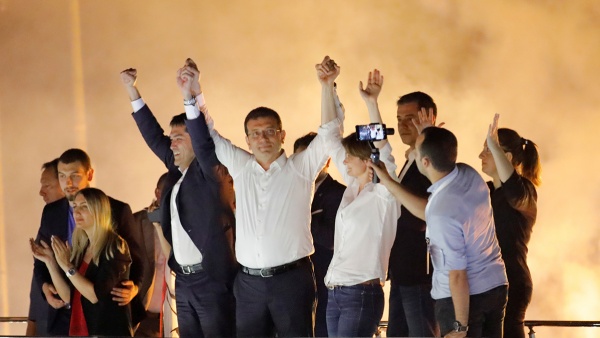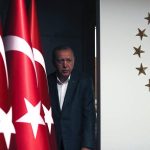Ekrem Imamoglu, mayoral candidate of Turkey’s main opposition party, greets supporters at a rally in Istanbul.
After his party suffered a humiliating loss in Istanbul, President Recep Tayyip Erdogan is down but far from out.
Ekrem Imamoglu’s stunning victory in the rerun of Istanbul’s mayoral election marks a new low for Recep Tayyip Erdogan and his long-ruling Justice and Development Party (AKP). But don’t expect the president to take the drubbing sitting down.
What’s Happening
The AKP went to the trouble of forcing Turkey’s Supreme Election Commission to nullify the results of Istanbul’s mayoral election in April because Erdogan did not like the outcome: Imamoglu, of the Republican People’s Party (CHP), beating the AKP’s Binali Yildirim, a former prime minister. In the rerun on Sunday, Imamoglu won once again, but by a far larger margin—as much as eight hundred thousand votes, by some estimates.
Why It Matters
This is a significant setback for Erdogan and the AKP. The president and his party are weaker now than at any time since they came to power almost seventeen years ago. Imamoglu’s supporters, who are celebrating the restoration of Turkish democracy, have every reason to be happy. Istanbul was the grand prize in an electoral season full of unexpected victories for the opposition, and the new mayor proved that the opposition is capable of offering Turks a positive vision and a credible alternative to the status quo.
Hurdles Ahead for Imamoglu
Now that the festivities are over, Imamoglu and the opposition will confront formidable obstacles to translating their victories into effective governance. Despite their recent miscalculations, Erdogan and the AKP will not give up so easily. Even under duress, they still have significant resources at their disposal to make governing as difficult as possible for Imamoglu. There is speculation that the government will seek to prosecute him on charges only the pro-AKP press believes. This would be a dramatic escalation in defiance of the vast majority of Istanbul’s voters and would further undermine the ruling party’s flagging legitimacy. After the rerun debacle, prosecuting Imamoglu is likely a risk Erdogan does not want to take.
More likely, Erdogan will issue presidential decrees limiting the ability of big-city mayors to spend financial resources to govern, blocking them from awarding contracts worth more than $5 million. The official rationale will be austerity—AKP mayors ran up huge debts—but Erdogan will actually be trying to make it harder for Imamoglu and others to peel big businesses away from the AKP.
In addition, Erdogan would like to prevent the new Istanbul mayor from investigating past corruption in city hall, and possibly even the relationship between previous city officials and certain cultural groups that have advanced Islamist—and even radical—agendas. This was the preferred strategy of some senior AKP officials before the election commission’s decision in April, but they failed to sway Erdogan. Now it seems like it is one of the president’s few options to circumscribe and obstruct Imamoglu.
Time for Erdogan to Recover
The second problem confronting the opposition is time. Since the spring of 2014, Turks have voted in two local elections, two presidential elections, three general elections, a referendum on the constitution, and the Istanbul rerun. There will not be another election until 2023. Erdogan and the AKP may have problems at the moment—a weak economy, an energized opposition, and fissures within the party—but that does not mean that Sunday’s results are a fatal blow.
Erdogan has a lot of time to regain his footing. He will no doubt try to neutralize his opponents within the AKP, especially old stalwarts like Abdallah Gul, Ali Babacan, and Ahmet Davutoglu, who have been waiting for Erdogan to falter. On the economy, his nationalist appeals have not worked, meaning that rumors of furtive Turkish approaches to the International Monetary Fund may come true. He will also have to try to woo back the large numbers of Turks who cast ballots for opposition candidates in the local elections because they seem to loathe Erdogan and his party. All of these are possible.
In Ekrem Imamoglu, Erdogan confronts the most interesting politician since he himself became mayor of Istanbul in 1994, promising clean government and a bright future. Erdogan was successful despite powerful forces trying to stop him. No doubt the Turkish president is hoping that the parallels end there.
By Steven A. Cook
Source: CFR



